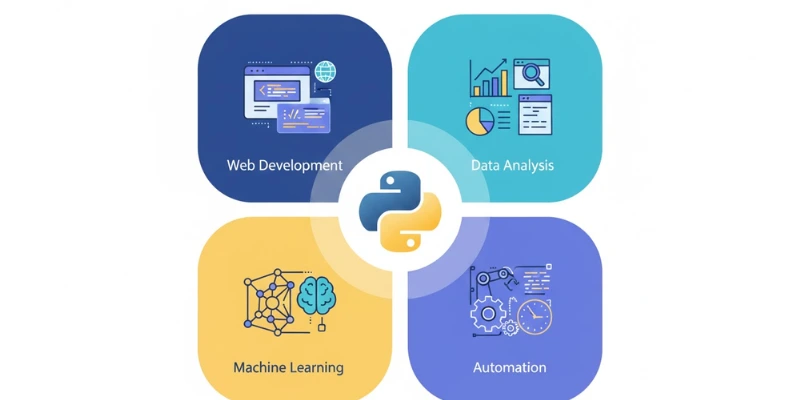
Python has become one of the most widely used programming languages in the world. because it helps beginners understand core concepts quickly while still offering powerful capabilities for advanced developers. For many learners, beginning this journey through the Python Course in Trichy becomes a meaningful first step toward building strong coding skills that support long-term career goals. As industries increasingly rely on automation, data, and digital tools, understanding what Python can do opens the door to the wide range of professional opportunities.
Python in Web Development
Python plays a significant role in modern web development because of its clean syntax and support from popular frameworks like Django and Flask. These tools help developers build secure, scalable, and well-structured websites without needing to manage overly complex code. Web applications today demand fast performance and seamless user experiences, and Python fits well into this environment. As learners strengthen their technical foundation often supported by structured learning such as Python Course in Erode, they can understand how Python integrates with databases, APIs, and front-end technologies to build complete web solutions.
Python for Data Analysis and Visualization
Data has become central to decision-making across industries, and Python offers powerful libraries that make data analysis accessible for both beginners and professionals. Tools like Pandas, NumPy, and Matplotlib help simplify tasks such as cleaning data, identifying patterns, and presenting results visually. Organizations rely on data insights to guide strategies, solve problems, and uncover opportunities, making Python an essential skill in data-focused roles. Building these capabilities allows learners to understand how raw data transforms into meaningful information that shapes business decisions and technological progress.
Python in Machine Learning and AI
Python has become a preferred language for machine learning because of its vast library ecosystem and simple syntax. Frameworks like TensorFlow, PyTorch, and Scikit-learn make it easier to build models that solve real-world problems such as recommendations, predictions, and automation. As industries shift toward intelligent systems, understanding how Python supports machine learning becomes increasingly important. Many learners strengthen this journey through Artificial Intelligence Course in Erode, where they explore how Python contributes to natural language processing, image recognition, and advanced analytics that power next-generation digital solutions.
Python for Automation and Scripting
One of Python’s major strengths is its ability to automate repetitive tasks. Whether it involves file management, data processing, testing workflows, or system operations, Python scripts help professionals save time and reduce manual effort. Automation is becoming a critical requirement in IT, business, and engineering environments because it increases consistency and minimizes errors. With Python, even small scripts can make complex operations simple and efficient. For learners, understanding automation not only builds programming confidence but also supports career readiness in fields that value productivity and workflow optimization.
Python in Software Testing
Python is widely used in software testing because it allows testers to write simple, readable scripts that help identify defects and ensure smooth functionality. Tools like PyTest, Unittest, and Selenium (with Python bindings) support test automation across various environments. As businesses aim to deliver high-quality digital products, the demand for professionals who can automate test cases continues to grow. Python’s versatility makes it suitable for functional, API, and system-level testing, helping testers validate applications more effectively. This skill becomes especially valuable for those looking to explore quality assurance and automation roles.
Python in Game and App Development
Although not always the first language associated with gaming, Python provides useful tools for building games and interactive applications. Libraries like Pygame offer a beginner-friendly way to create simple games while understanding logic, loops, events, and graphical elements. Python also plays a supporting role in large-scale game engines, helping with scripting, tools, and automation within the development environment. For app development, Python frameworks help create user-friendly interfaces and cross-platform applications, and learning these concepts alongside the Artificial Intelligence Course in Trichy can give learners a broader understanding of how software components come together.
Python for Cybersecurity Tasks
Python is frequently used in cybersecurity because it allows experts to build tools that automate scanning, testing, and threat detection. Security professionals use Python scripts to analyze logs, identify vulnerabilities, and create penetration testing utilities. Its ability to interact with networks, system files, and APIs makes it a valuable tool in security analysis. As cyber threats grow more sophisticated, understanding Python helps individuals adapt to evolving security needs while building a strong technical foundation that supports advanced learning in penetration testing, monitoring, and incident response.
Future Scope of Python Skills
Understanding the four main uses of Python helps learners see how flexible and powerful the language truly is across web development, data handling, machine learning, and automation. Mastering these areas not only improves problem-solving abilities but also strengthens career readiness in today’s fast-paced digital world. For beginners seeking long-term success, supporting this journey through the Python Course in Salem, provides the clarity and confidence needed to build a strong future in the tech industry.
Also Check: Why Is Python Considered the Best Language for Data Science?